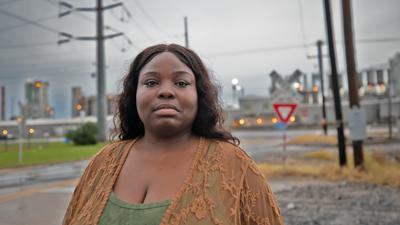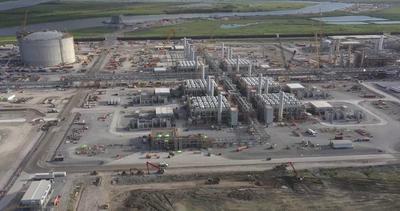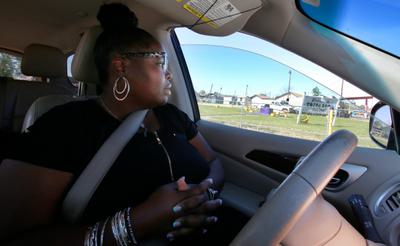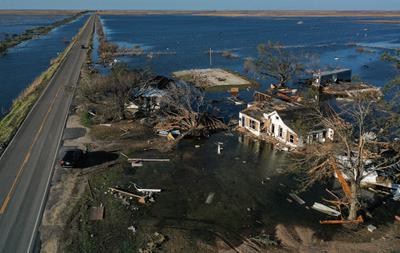The Calcasieu Pass gas export plant under construction Cameron Parish, Louisiana. A second export plant, Calcasieu Pass 2, is planned. Venture Global
Yale Environment 360: How did you come to found the Vessel Project?
Roishetta Ozane: In 2020, I’d ended up homeless with my six children after losing everything in Hurricanes Laura and Delta. I realized that I lived in a community that was surrounded by billion-dollar industries that had very little resources for people who looked like me. I got on Facebook and asked, “Who needs help?” So many people needed food. They needed water. People were newly homeless.
I was looking at the connections between industrial pollution, the storms that were happening across Louisiana and Texas, and the proposed industry coming along the Gulf Coast. I was beginning to recognize how all of this was connected when I heard about these 20 proposed LNG terminals. My first question was, “Where are they going to go?” I had this overwhelming feeling that they were going to push out more Black communities. I didn’t want that to happen, so I wanted to educate people.
e360: What does it mean to say the Vessel Project is a “mutual-aid” organization?
Ozane: I don’t have any federal funding. I get a few small grants from organizations, but a lot of the funding comes from crowdsourcing from across the U.S. I assist people with food, shelter, water, clothing, paying their utility bills, paying their rent. But then they come to our community outreach meetings, they protest. [In late June] I was able to organize over 200 people from Texas and Louisiana to march with over 1,000 people down Wall Street to tell banks to stop funding environmental racism in our communities. I can’t talk to a person in my community about CP2 coming when they can’t feed their families, when they can’t pay their rent. We’re building community from the ground up, making sure that our community is strong enough to withstand whatever comes at it.
“I immediately knew that those industries were bad… The air smelled like rotten eggs one day and like Clorox the next.”
e360: Were you already noticing the impacts of the petrochemical industry in the air, in the water?
Ozane: I’m originally from Mississippi. When we first came to Louisiana in 2003, I immediately knew that those industries were bad because we could see the fires and the smoke. The air smelled like rotten eggs one day and like Clorox the next. It made me sick. One of my sisters who worked at a petrochemical plant ended up being diagnosed with cancer at age 30. Her job was to watch the flare to see how big or small it would be, but she didn’t know what was coming out of that thing.
Three of my children have eczema, and two have asthma. My son was recently diagnosed with epilepsy. He started having seizures last year, at the age of 17. He had his first seizure while driving between two facilities that had flares going. Those flares are loud, they are bright, and those are seizure-triggering things. It was also a couple days after the explosion at [a local refinery]. I tried to get answers, but everybody I talked to said that the chemicals released from these facilities disappear out of your blood quickly.
e360: Is anybody tracking the incidences of cancer, asthma, epilepsy in the region?
Ozane: There have been studies done by Tulane and LSU, but the studies I’ve seen have been paid for by industry and are biased. The state of Louisiana has said that even though cancer rates are going up, there is no way to say that they’re going up because industry has grown. Louisiana is third in the nation for cancer rates. People hear about Cancer Alley, not understanding that the entire state of Louisiana is a cancer state. I live about three and a half hours from Cancer Alley, and my community is surrounded by more than a dozen petrochemical and gas facilities and three LNG facilities.
e360: How does liquid natural gas harm the environment even before it’s burned?
Ozane: LNG is produced by super cooling the gas into a liquid. The process of liquefying releases methane into the atmosphere. And shipping it across the ocean means more tanker traffic and dredging, more pollution, more pollution of our seafood. It’s all for export, while driving up our energy costs here. Natural gas prices in southwest Louisiana are some of the highest in the state.
e360: But it’s bringing jobs and infrastructure?
Ozane: They don’t provide the number of jobs they promise, and the folks who are working at those facilities are retiring with cancer. If they’re bringing so many well-paying jobs, why are these communities still in the shape they’re in? Why are people still reaching out to my organization for assistance paying their rent and their light bills?
e360: How much does racism play into all this?
Ozane: Racism plays a big role, because when white and wealthier people were saying, “We don’t want these facilities in our neighborhoods,” they were built in low-income and people-of-color communities. The Vessel Project fought coal in Westlake, Louisiana, and right behind coal came LNG. And right behind LNG, now, you have [new] petrochemical plants. And right behind that is coming CCS [carbon capture and sequestration]. It’s coming to the same communities over and over and over.
“Cancer Alley in Louisiana is not the only Cancer Alley. Other communities that look like mine are overrun with polluted air.”
e360: How much do you make climate change an explicit part of the conversation at Vessel Project?
Ozane: I’ve learned through doing this work that if you want to bring people to the table, you have to be gentle when you’re talking about issues that have been politicized. So we might not necessarily say the words “climate change,” but people understand that something is wrong when two historical hurricanes come to one area back-to-back. And that’s followed by a flood, and that’s followed by a freeze, and they’re pushed out.
You’re talking about a red state in the South, so we try to keep those types of words out of the conversation and instead teach people that your environment starts with your body. If you’re not breathing clean air and clean water, you’re not healthy. You’re not going to feel well, which contributes to you not wanting to go to work, not being able to be your best self. We talk about industrial pollution, methane emissions. We can have a crawfish boil and we talk about the fact that we had less crawfish this year than last year. And somebody in the audience is going to say, “That’s because of climate change.” We don’t have to put it on the flyer that we’re talking about climate change, but because we’re connecting the dots, people get it.
Damage from Hurricane Delta in Cameron Parish, Louisiana in October 2020. STRINGER / AFP via Getty Images
e360: It appears that the Department of Energy is set to decide on the license for CP2 in January 2025.
Ozane: We’re pushing them to speed things up. Because we don’t know how this election is going to go. We’re hoping people will vote on the issues that are going to save their communities. We need the Biden administration to be in office again to make sure that the policies he’s enacting are turned into bedrock legislation. The state of Louisiana just had a judge try to overturn the LNG pause. The FERC approved this permit for CP2, fully knowing it can’t go anywhere without its DOE permit. [With the Sierra Club and the NRDC] we’re taking all the necessary steps to bring this to court and get this permit thrown out.
e360: To what extent are your activities now focused on the national level?
Ozane: In the short term, I’m focused on elections at home, in Louisiana. I am trying to make sure that people in communities that look like mine are registered to vote, are educated on the issues. On the national level, I’m trying to go to states that have communities that look like mine to connect these issues so that people know these are not one-offs. Cancer Alley in Louisiana is not the only Cancer Alley in the United States. Other communities that look like mine are overrun with polluted air, polluted water. Flint, Michigan’s water crisis is also happening in Sulphur, Louisiana. There’s a water crisis in Jackson, Mississippi. We need to start talking about how these issues are connected, how the people in these communities all look alike, and why they’ve been sacrificed for so long.
e360: Given the latest developments on CP2, how do you maintain your optimism?
Ozane: Every morning when I wake up, I see my children, and they have this happiness, these smiles. And let me tell you, my children are not hidden from this. If you look back at our Climate Week post, you’ll see my children on the frontlines holding banners. But the fact that they still get up every day smiling, laughing, knowing the fight ahead, it gives me hope. Because I know that if I don’t live to see any of what I’m fighting for come to fruition, I am raising the next generation of environmental activists, of climate activists, and the fight will continue until we win.
This interview was edited for length and clarity.






